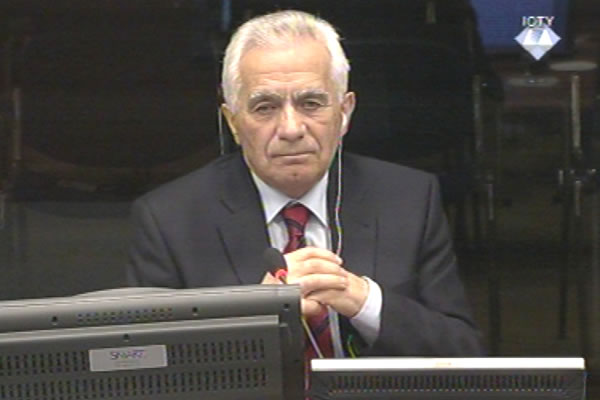Home
MILOSEVIC’S ‘NASTY WORDS’ ABOUT KARADZIC AND KRAJISNIK
The prosecutor contested Momcilo Krajisnik’s claim that the goal of the Bosnian Serb leadership was merely to ‘defend their territories’ showing the evidence about their aspirations vis-à-vis the municipalities with a non-Serb majority. As the prosecutor noted, this prompted Slobodan Milosevic to insult Krajisnik and Karadzic roundly in their absence at a meeting in May 1995. Milosevic said that Krajisnik was ‘normal, but stupid’, while Karadzic was ‘abnormal’
 Momcilo Krajisnik, witness at the Radovan Karadzic trial
Momcilo Krajisnik, witness at the Radovan Karadzic trial Continuing the cross-examination of Momcilo Krajisnik at the trial of Radovan Karadzic, the prosecutor contested Krajisnik’s claim that the goal of the Bosnian Serb leadership was to establish an entity in the part of BH with a Serb majority. Krajisnik claimed that the ‘armed people’ seized the municipalities with a Serb majority, and that the Republika Srpska Arrmy subsequently defended them. This rounded up the territory that was allegedly allotted to the Serbs at the pre-war peace talks.
The prosecutor noted that some municipalities in Republika Srpska did not have a Serb majority before the war. Foca was a case in point, as the Muslims were a majority population there, yet the Serbs captured it, succeeded in ethnically cleansing it and renamed it Srbinje. A video recording of a rally in Foca in May 1994 was played in court. ‘I am glad that today I see a true Serb town here, so unlike what was here before. You are an example to all the Serbs because you have managed to eliminate the stings aimed at you by the SDA leadership,’ Krajisnik said at the rally. Since in his evidence Krajisnik claimed that the territories were seized only temporarily during the war, the prosecutor ironically asked him if in his speech he had laid the ground for the return of Muslims. The witness replied that it was a war-time ‘political speech’; he would have acted differently today.
The proof that Karadzic’s and Krajisnik’s leadership tried to seize non-Serb municipalities is reflected in their continuous bids to capture Orasje, the prosecutor noted. Croats were in the majority there. The prosecutor showed the minutes from the meetings and public appearances in which Krajisnik demanded that Orasje be taken. The prosecutor also showed an entry from Ratko Mladic’s war diary, made in May 1995, recounting how Slobodan Milosevic criticized the Bosnian Serb political leadership for their efforts to occupy the municipality of Orasje. Milosevic said that Krajisnik ‘seems normal but is actually stupid’ while Karadzic ‘is abnormal’. In Milosevic’s words, Karadzic was a poor history student caught up in poetic exaltation. Krajisnik explained that Milosevic was in conflict with Karadzic at the time, and this is why he used those ‘nasty words’. Also, Krajisnik admitted that during the war, Orasje was a target because of its military and strategic importance.
The prosecutor also focused on Krajisnik’s allegation that the document known as Variant A and B was completely ‘benign’. Krajisnik argued that he first heard about the document at the beginning of his own trial in The Hague. The paper, dating from December 1991, contains instructions to the local SDS leaderships to seize power in the municipalities with a Serb majority (Variant A) and the municipalities where they were in the minority (Variant B). The witness was shown several intercepted conversations in which Karadzic openly says that the power in the municipalities was seized in line with the document. Krajisnik told the prosecutor to ask the accused about it. The prosecutor brought up the minutes of various meetings where the controversial document was mentioned in Krajisnik’s presence. Krajisnik responded laconically that at those moments he simply ‘didn’t listen’ to the speakers.
Krajisnik resorted to similar excuses when the prosecutor confronted him with the evidence that showed that the army did not act on its own initiative when it took UN members hostage and placed them around potential NATO targets in the spring of 1995. In several intercepted conversations with various persons from the Serbian émigré community, Krajisnik admitted that the political leadership would decide on the fate of the UN hostages and that they wouldn’t be released until the goal was accomplished. Today Krajisnik explained that in fact he tried to ‘keep the people I talked to happy’, as they were radical by nature. The goal of taking UN staff hostage was ‘only’ to divert NATO strikes, Krajisnik explained, which is in fact the prosecution’s case.
As the hearing drew to a close today, Radovan Karadzic began re-examining his witness.
Linked Reports
- Case : Karadzic
- 2013-11-19 KRAJISNIK IS ‘NOT CREDIBLE’ AS WITNESS
- 2013-11-18 BRDJANIN SORRY HE COULD NOT BE TRIED ON ‘NEW STANDARDS’
- 2013-11-15 WAS KARADZIC ‘AGGRESSIVE’ OR ‘VIOLENT’?
- 2013-11-21 KARADZIC AND KRAJISNIK FOR EU IN BALKANS
- 2013-11-26 KARADZIC DISTANCES HIMSELF FROM CRIMES IN KRAJINA
- 2013-11-27 ‘UNOFFICIAL’ FORCIBLE EVACUATION
